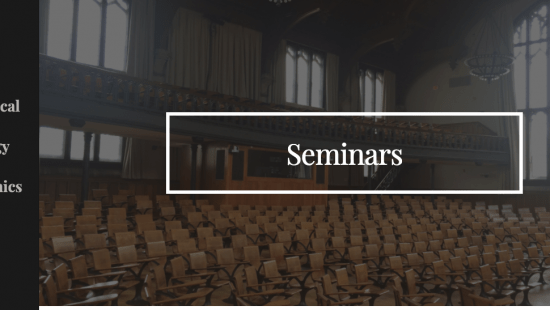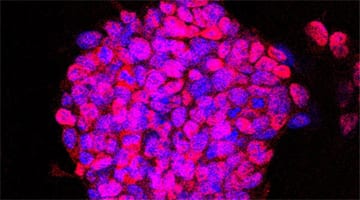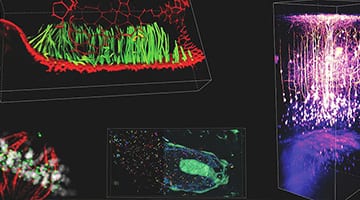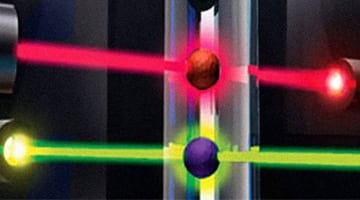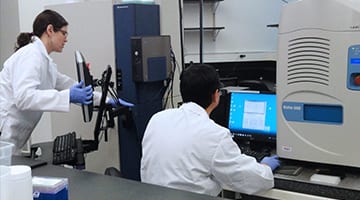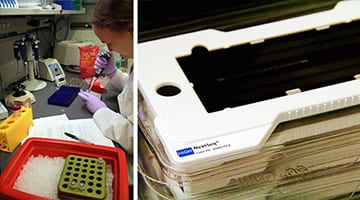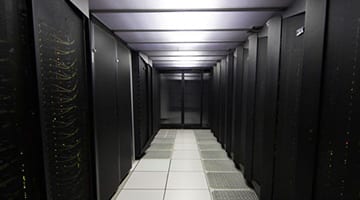Affiliated Training Programs
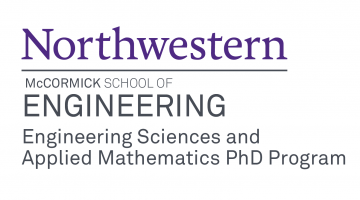
Applied Mathematics Program (Ph.D.)
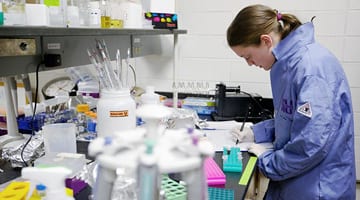
Chemical Biological Engineering Graduate Program (Ph.D.)
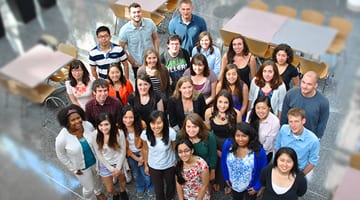
Driskill Graduate Program in Life Sciences (Ph.D.)
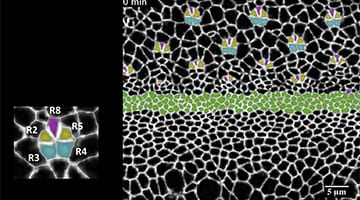
Interdisciplinary Biological Sciences Graduate Program (Ph.D.)
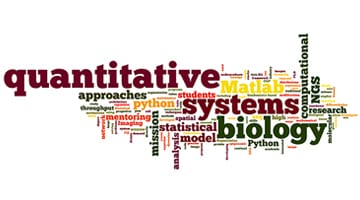
Masters in Quantitative and Systems Biology
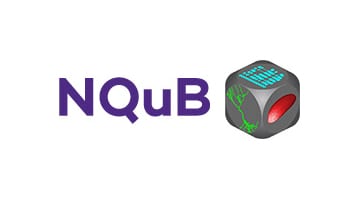
Quantitative Biological Modeling Research in Training Program
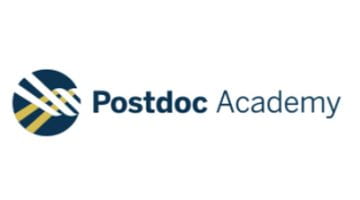
Postdoc Academy
Professional development for the postdoctoral community
Courses
Applied Linear Algebra: ES_APPM 395
Nearly every discipline with a quantitative component including engineering, physical sciences, social sciences, finance, computer graphics, big data, and machine learning rely on linear algebra. Numerical computation greatly enables modeling the data analysis in these fields. In order to utilize linear algebra and computing for problem solving, it is essential to understand how to set up problems (in the linear framework and numerically), determine when well defined solutions exist, write programs and algorithms in MATLAB to solve these problems, evaluate whether the algorithm will find the solution efficiently, and evaluate the accuracy of the computation.
Professor: Niall Mangan
Bioinformatics: Biological Sequence and Structure Analysis: BIO_SCI 323
BIO_SCI 323 explores through case studies and classroom discussions, the principles and practical applications of computational tools in contemporary molecular and structural biology research. Besides gaining an appreciation for the algorithmic aspects of these tools, students will learn to code with python and R, design and perform experiments in silico, and critically evaluate results.
Professor: Ishwar Radhakrishnan
Models in Applied Mathematics: ES_APPM 421
Modern data streams, whether from biomedical research labs or environmental and social-science research teams, are quantitative and noisy. The goal of this class is to help you begin to think quantitatively and statistically about data, and to help you answer the question What do your data (actually) say?.
To help you answer this question, we present an approach centered on applying statistical and mathematical techniques the modern way: with a computer. More specifically, this course is not a substitute for a Machine Learning, AI, or classical statistics course. Instead, we will cover topics like parameter estimation, hypothesis testing, and dimensionality reduction in a way that is centered on the specific information that you know about your data. By the end of the course, you will have a set of tools that should allow you to attack any quantitative problem, make a conclusion, and assess your confidence in that conclusion.
- Students will learn to make and manipulate empirical data distributions in their computers. Students will be able to use these distributions to test different hypotheses about their data without relying on specialized statistics software.
- Students will be able to identify the advantages and disadvantages of different statistical, mathematical, or computational techniques and will be able to determine appropriate methods for their data.
- Students will be able to use data to construct models appropriate to their research question.
- Students will be able to evaluate their model’s accuracy and efficacy and to compare their models to others.
Professor: Madhav Mani
Numerical Methods for Random Processes: ES_APPM 448
Analysis and implementation of numerical methods for random processes: random number generators, Monte Carlo methods, Markov chains, stochastic differential equations, and applications.
Professor: Hermann Riecke
Principles and Methods in Systems Biology: IBIS 404
IBIS 404 uses mathematical-based experimental analysis and modeling to study biological problems. The class will introduce quantitative techniques, computational tools and biological systems that help investigators analyze heterogeneous complex data about molecular networks to uncover meaningful relationships about key components.
Professor: Richard Carthew
Quantitative Analysis of Biology: BIO_SCI 354/ ES_APPM 395-0
BIO_SCI 354 will be a course where we cover some the landmark results in quantitative biology. Every module (of which there are 5-6) will end with analysis of a data set acquired from the authors of studies and reanalysis and re-plotting of a central result from the paper. En route to that I will teach you the biology mathematics physics and statistics required to make the plots. The landmark papers will span from studies in gene regulation, developmental biology, sequencing etc.
We will also have various crash courses in coding, image analysis, etc.Introduction to landmark insights into quantitative biology. Random genetic processes, gene expression, cell adaption, cell cycle, developmental morphogens, phylgenomics.
Course website: https://madhavmani.wixsite.com/qbiocourse
Professor: Madhav Mani
Quantitative Biology: IBIS 410
Quantitative approaches to molecular and cell biology, focused on developing an understanding of connections between biomolecule structure and dynamics, and behavior of cells. The course will also include review of topics from statistics of random variables and statistical data analysis relevant to biology and biophysics.
Professor: John Marko
Quantitative Experimentation in Biology: BIO_SCI 359
BIO_SCI 359 is taught in 4 modules, which will involve students repeating experiments from some of the landmark papers in quantitative biology. Groups of students will work together and learn how to do experiments in a wet lab, perform live-imaging, conduct sequencing based studies, analyze their own data, and presentation skills.
Professor: Richard Carthew
Statistical Methods for Bioinformatics and Computational Biology: Stats 465
The goal of this course is to provide an introduction of statistical methodologies in important topics in bioinformatics and computational biology. The course covers statistical methodologies used in two major topics, including gene expression data analysis and high-throughput DNA sequence analysis. Statistical theory and methods in this course include Z-test, t-test, regression, ANOVA, multivariate data analysis, Bayesian statistics, bootstrap, Monte-Carlo simulation, clustering algorithms, Markov Chain, Hidden Markov Chain, mixture model, etc. Students will learn basic knowledges and programming skills to perform most common bioinformatic analyses of data generated from current molecular biology research. The lectures will cover both principles of genomics and basic R coding to perform the statistical analyses. Students who are interested in bioinformatic research, gene expression analysis and high throughput sequence data analysis are highly encouraged to take this class. Professor: Jiping Wang.
QBio Trainings Online
What do your data say? Python Tutorial
This tutorial is intended as a brief introduction to computer programming for data analysis in the Python scripting language. By the end of this tutorial, a student should be able to write simple Python programs, load and visualize data sets, and read and understand other Python code.
This tutorial will be conducted using Jupyter notebooks, which provide a free and easy-to-use kernel for Python programming.
It is recommended that any user of this tutorial does not simply skim through this material, but actually takes the time to type out and execute every example and problem that is presented.
https://www.whatdoyourdatasay.com/python
Talks by Madhav Mani
Find on this website a simple repository of talks by Professor Madhav Mani, Northwestern University.
https://www.madhavmani.com/talks
Physical Biology of the Cell Course
BE/APh161: Physical Biology of the Cell Course
Instructor: Professor Rob Phillips, Caltech
http://www.rpgroup.caltech.edu/aph161/syllabus?s=03
It is a wonderful time to be thinking about the workings of the living world. Historic advances in molecular biology, structural biology and the use of biophysical techniques such as optical traps have provided an unprecedented window on the mechanics of the cell. The aim of this course is to study the cell and its components using whatever tools we need in order to make quantitative and predictive statements about cellular life. The main intellectual thread of the course will be the idea that the type of quantitative data which is becoming routine in biology calls for a corresponding quantitative modeling framework. The plan of this course is to elucidate general principles with exciting case studies.
Team Science
International Network for the Science of Team Science
INSciTS is the membership organization for all stakeholders invested in team science. Individuals leading, engaging in, managing, facilitating, supporting, evaluating, and producing scholarship on team science will find a professional home in INSciTS. INSciTS is a forum to share the latest evidence for what works in team science and collaborate with one another to advance the SciTS field.
https://www.inscits.org/
TeamScience.net
TeamScience.net provides resources to help you learn to perform transdisciplinary, team-based translational research. There are eight learning modules that covers topics on the science of team science, behavioral team science, biomedical team science, clinical team science, stakeholder dialogue about evidence-based practices, implementation of evidence-based practices, and collaborative decision-making with communities.
https://www.teamscience.net/
Team Science Graduate Course
The 0.5-credit Team Science Graduate Course will be offered via the MPH program and is open for anyone interested in Team Science. It’s designed to expose students to the principles of team dynamics, organization and leadership. Pub Hlth 313: Topics in Public Health, Team Science .
https://www.feinberg.northwestern.edu/sites/cehs/our-programs/program-in-public-health/current-students/courses.html
Resources @ Northwestern University Clinical and Translational Sciences Institute
NUCATS provides investigators, participants and stakeholders in the research continuum with an extensive array of resources, consultative services and expertise in order to accelerate transformative scientific discoveries from the lab to patients and the community. It is our goal to continually increase the quality, safety, efficiency, speed and impact of innovative clinical and translational research. They host a comprehensive list and links to Team Science–related resources.
https://www.nucats.northwestern.edu/resources/team-science-resources.html
Core Facilities
Affiliated Research Centers
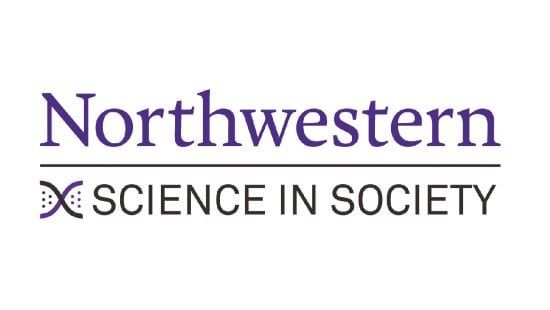
Science in Society
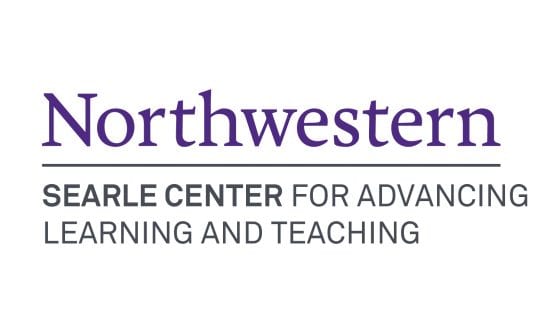
The Searle Center for Advancing Learning and Teaching
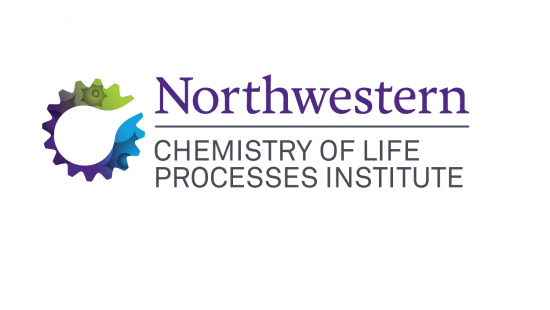
Chemistry of Life Processes Institute
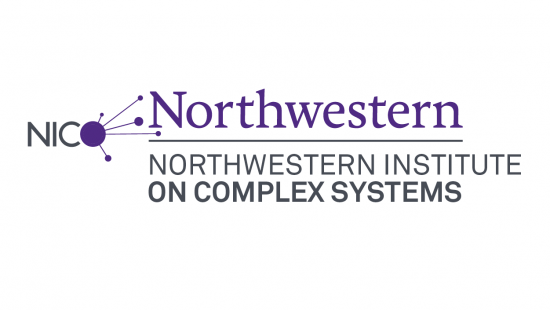
Northwestern Institute on Complex Systems (NICO)
